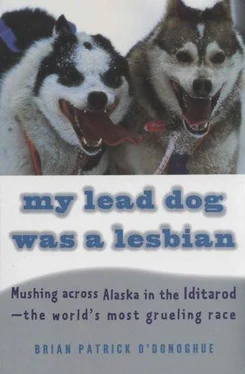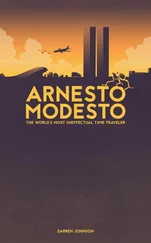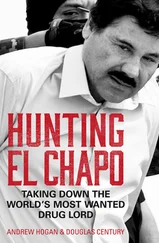Brian Patrick O’Donoghue
My Lead Dog Was a Lesbian
A native of Washington, D.C., Brian Patrick O’Donoghue has worked as a cab driver in New York City, a cargo ship wiper, an elevator mechanic’s helper, a pipefitter’s apprentice, a science museum technician, a press photographer, and a TV and print journalist. These days he reports on the oil industry, politics, and sled-dog racing for the Fairbanks Daily News-Miner. O’Donoghue, 40, and his wife, Kate Ripley, live in Two Rivers, Alaska, with a howling kennel of retired Iditarod dogs.
This book is dedicated to Doc,
who showed us the way,
and B.L.,
who had the spirit
but none of the luck

CHAPTER 1. Klondike Lesson
The jitters were gone. I hadn’t lost the trail or my dog team. Nobody was limping from injuries or fights. My dogs looked absolutely great, and little Raven was playing cheerleader as usual.
I knew better, but I couldn’t resist. With one hundred miles left to go in the Klondike 200 I began imagining how amazed people would be at the finish line. Entering the Klondike, my sights had been set on merely finishing. My farthest trip on a dogsled had been 50 miles. This race stretched 200 and I had to go the distance to qualify for the Iditarod, Alaska’s Great Race to Nome. The dogs and I were already signed up for the main event, just six weeks away, but I still had to earn the right to compete. More than six months of preparation and thousands of dollars were riding on our performance here. I had to succeed.
But such concerns were behind me now. As I packed to leave Skwentna Roadhouse, the Klondike’s halfway point, a top ten finish looked to be in the bag. This wasn’t the way the Coach, Tim Mowry, and I had planned it. Our strategy, developed over a few beers back home at Deadline Dog Farm, called for me to tag along behind other, more experienced mushers. But the dogs were proving more ambitious.
The Mowth was stuck in Fairbanks, pulling the weekend shift at the News-Miner’s sports desk. I’d recruited two friends from the Matanuska Valley, Vicki and Cyndi, as my Klondike handlers. None of us knew what we were doing as I steered Mowry’s old Ford, loaded down with howling dogs and gear, onto the ice at Big Lake. But then ignorance had become a defining characteristic of this reporter-turned-dog-musher’s brief racing career.
I’d drawn the last position, number 18. My parking spot was located at the far end of the staging area. Driving to it, across the frozen lake, we nervously scanned the other racers readying their teams for departure.
I directed my unschooled pit crew sorting through the mess of harnesses and lines. Finally we began hooking up, connecting a pair of dogs at a time, in eight-foot intervals along the gang line. I was taking 12 out today, two more than I’d ever harnessed before. By the time we were done, the gang line, a plastic-coated steel cable channeling the team’s power back down the center, stretched over 50 feet ahead of me. Standing rigidly at the far end—“Good dogs!”—Rainy and Casey looked impossibly distant. They looked back at me, impatient to go.
Another friend, Sandy, turned up at the last moment. The big schoolteacher’s arrival was perfectly timed, and I drafted her for brake duty, sharing the runners with me on the back of the sled. Cyndi and Vic were positioned along the gang line, ready to lead the dogs to the starting line, which was painted out on the lake ice, some 200 yards away.
Sled dogs begin each run like champions, or demons, depending on their musher’s readiness. The trick is to hang on tight until they settle down. But that’s easier said than done. It’s bad enough setting forth on familiar trails. In the riotous atmosphere of a race, stirred by comradery and fresh smells, a sled dog’s inborn enthusiasm reaches a frenzy. Excitement had been building in my team since we began loading the dog truck that morning. They all recognized the signs. We were going someplace new.
I slipped off the knot anchoring my sled to the truck’s front bumper. The team bolted toward the starting line. My overmatched crew began slipping. Big Sandy and I jammed our heels on the brake claw, with little effect — besides etching a pair of fresh streaks on the ice. Cyndi wisely let go. Vicki fell but maintained her grip on the gang line, as she scooted down the lake on her ass.
“Just get out of the way, Vic. We’ve got it.”
She shrugged and let go. Two of my younger males stumbled over her. My eyes remained focused on the trail ahead. A hairpin turn waited at the end of the staging area. What would I do if they headed for the parking lot? I needn’t have worried. Out on the lake, over a dozen rippling chains of dogs were visible. Mine rounded the corner in full loping stride, whipping the sled sideways. They were determined to catch the other teams.
Race marshal Kevin Saiki waved me straight through. Sandy was no longer sharing the runners. I assumed she had bailed out, stepping off the runners as soon as she saw that the team was on track. But I didn’t see her in the crowd, which was receding fast. Actually, Sandy had been flung clear at the turn. Cyndi watched her skidding away and was reminded of a bowling pin.
The Klondike’s opening miles passed through a network of frozen lakes. Through most of it, the dogs had me at their mercy. I just rode the brake, watching others taste disaster. One dog team went careening down a driveway and over a snowmachine, ripping off its windshield. I saw local kids chasing through the woods after another team that was missing its driver.
I had passed the man, a veteran Iditarod musher, seated in the snow. He smiled and waved at me like a casual spectator. His manner struck me as odd, but I had no time to wonder why. My lead dogs leaped over a fallen log, and the others swiftly followed. My sled smacked the thick trunk, went airborne, and I steered it through the air.
Later I learned the cause for the musher’s strange expression. As his dogs jumped that same fallen tree, the unlucky racer had caught a leg under it. Something had to give against the pressure exerted by his 12-dog team. He let go as his leg splintered in a compound fracture. Another racer paused long enough to prop the injured musher in the snowbank, where I saw him, while local kids fetched help. Shock was apparently setting in by the time I passed by.
Leaving the lakes behind, we climbed a few hills then entered a broad lane through thick trees. The trail here was well-packed, a sign of heavy traffic. Not far ahead, I knew, a sharp turn was coming, one I’d been warned not to miss. From that point onward, Klondike racers followed some 70 miles of the Iditarod Trail, a historic gold-rush route to the Interior mines.
I was still looking for that turn when Casey showed signs of lagging. No surprise there. We’d been on the trail more than an hour, and that was Casey’s usual limit for leading. I swapped her with Raven, but my little black-haired princess wasn’t in the mood to run out front. She kept darting left and right, tripping Rainy, her coleader, and the swing dogs running directly behind. After several pauses to untwist lines wrapped around careless paws, I played a hunch and moved Harley up front.
Harley and Rainy made an odd, but effective pair. Rainy was one of our kennel’s smaller dogs, weighing 35 to 40 pounds at most, with brown hair and squirrellike movements. Harley cut a hulking figure, twice her size and splotched black, white, and brown. When he ran, Harley’s ears flopped up and down, keeping time with his lumbering stride.
Читать дальше













